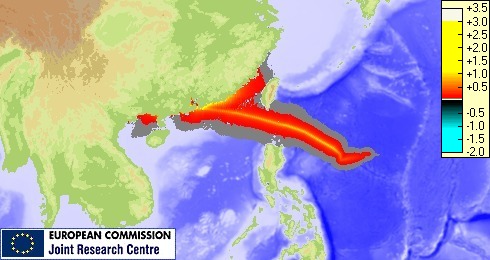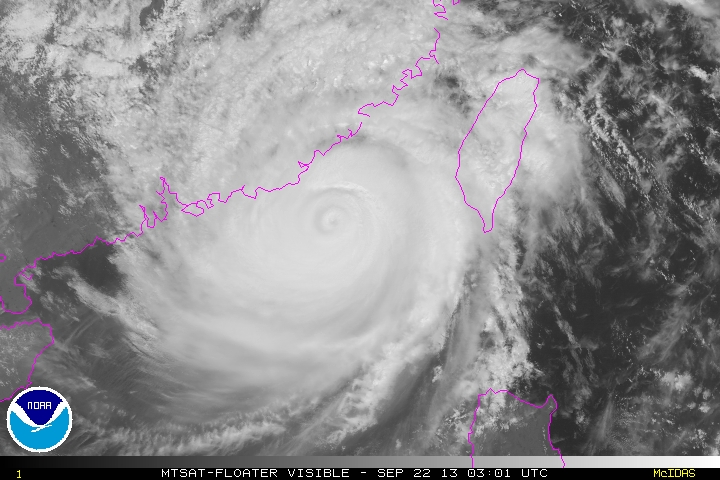Record warm waters fuelling Typhoon Usagi bearing down on Hong Kong and China

Image: Projected storm surge impact of Typhoon Usagi. Courtesy: GDACS
Warmer surface waters contribute energy for much stronger, more intense storms. Parts of the Western Pacific have experienced record and much warmer than average sea surface temperatures in August, part of record global sea surface temperatures.
A NASA analysis of the storm remarked on it's super rapid intensification, identifying warm ocean waters as a contributor to the storm's rapid growth and strength.
Data was collected on Thursday, September 19, 2013, when Usagi was at category 3 on the Saffir-Simpson hurricane intensity scale. A few hours later, Usagi completed its lightning-fast intensification to category 5, the highest category in the scale. While the center of this tropical cyclone is forecast to past just south of Taiwan in a few days, some forecasts have it striking Hong Kong a few days after that.A number of the features of the TRMM radar observations are consistent with a well-organized storm with an efficient "heat engine." A tropical cyclone's heat engine extracts heat from the ocean's surface through wind-enhanced evaporation and converts a portion of that energy into kinetic energy of the destructive winds that circle under the eyewall of the storm. The eyewall is an arc or ring of string storms just outside the mostly cloud-free eye at the center of rotation of the tropical cyclone.
A global analysis on ocean temperatures from NOAA for August stated:
"The August global ocean temperature tied with 1998, 2003, 2005, and 2009 as record highest for August, at 0.57°C (1.03°F) above the 20th century average. Regionally, the tropical oceans (20°N–20°S) were 12th warmest on record for August, while both the Northern and Southern Hemisphere oceans above 20° latitude (outside the tropics) were record warm, at 0.81°C (1.46°F) and 0.55°C (0.99°F) above their long-term averages, respectively. With respect to specific areas, according to the Land & Ocean Temperature Percentiles map above, part of the Barents Sea in the Arctic region, sections of the western Pacific Ocean, and part of the south central Indian Ocean were record warm for August. Many other regions across all of the oceans were much warmer than average."
Super Typhoon Usagi, a Saffir-Simpson Category 5 tropical cyclone that formed mid-September was the strongest storm so far in 2013. Maximum sustained wind speed is estimated at 259 km/h. Maximum storm surge height is 2.3m when it hits Imtin, China at 18:00 22 September.
The Typhoon developed from a tropical depression from September 16 to 18, rapidly picking up energy and moisture from the warmer than average waters before causing 8 metre waves, torrential rains, landslides as it passed between the Northern Philippines and Taiwan leaving destruction in its wake.
The typhoon is heading straight for Hong Kong and China, although has reduced slightly in intensity. It will be the strongest storm in 34 years to hit Hong Kong. All flights from and to Hong Kong have been cancelled.
Sources:
- Global Disaster Alert and Co-ordination System - Orange alert for storm surge impact in China
- NASA, 20 September 2013 - NASA Sees Super-rapid Intensification of Supertyphoon Usagi
- ABC News, 22 September 2013 - Typhoon Usagi batters southern Taiwan and northern Philippines, barrels toward Hong Kong

Get Involved
If you'd like to help with maintaining or developing the website, contact us.
Publish
Publish your stories and upcoming events on Indybay.


